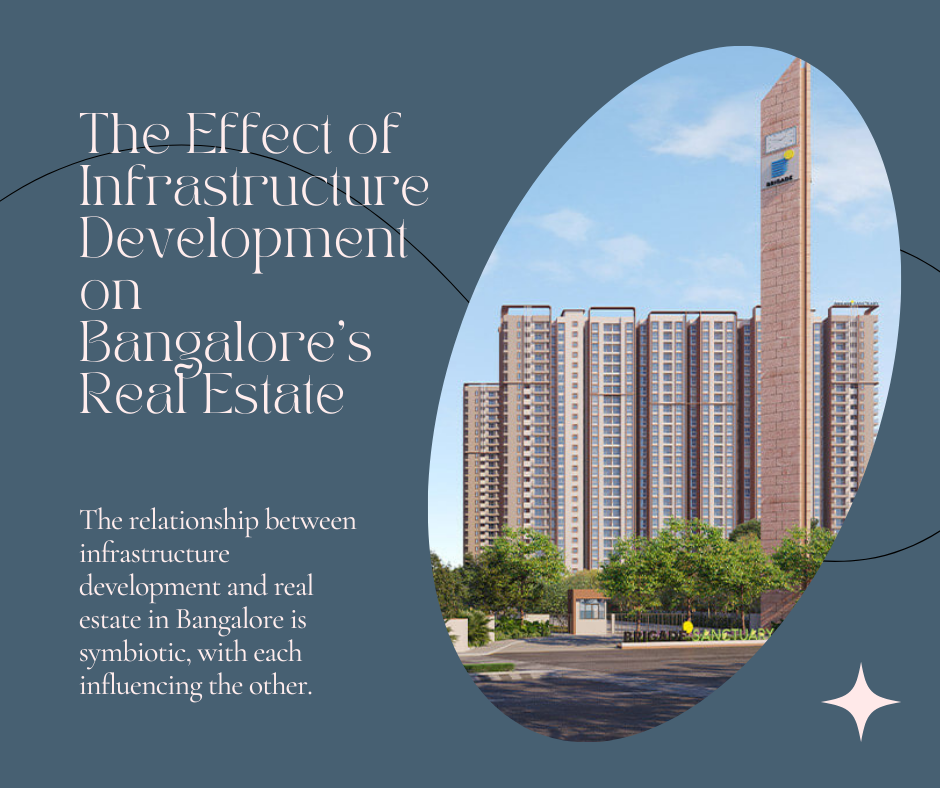The Effect of Infrastructure Development on Bangalore's Real Estate
Read latest blogs and articles from Housystan

The Information mentioned here was last updated on:
29/1/2026The Transformation of Bangalore's Real Estate Through Infrastructure Development
Bangalore, often dubbed the Silicon Valley of India, has witnessed a significant transformation over the past few decades. At the heart of this transformation lies infrastructure development, a key driver that has steered the real estate market toward new horizons. With its bustling IT sectors and burgeoning social infrastructure, the city continues to attract a swarm of professionals and investors alike. Let’s unravel how infrastructure development has been shaping Bangalore’s real estate landscape.
Understanding Infrastructure Development
- Verified Tenants/Buyers
- Unlimited Property Listing
- Zero subscription/charges fee
Infrastructure development refers to the construction and enhancement of fundamental facilities and systems serving a city. This includes transportation networks, utilities, and communications systems. In Bangalore, these developments play a pivotal role in determining real estate values and the city's overall growth trajectory.
The Metro Revolution
One of the most substantial influences on Bangalore’s real estate market is the Namma Metro. Inaugurated in 2011, this extensive rail network aims at decongesting roads and improving connectivity across key parts of the city.
Expanded Connectivity
With extensive metro lines connecting the outer stretches of the city to its central business districts, areas once considered the outskirts have become prime real estate spots. For instance, localities like Whitefield and Electronic City, home to many tech parks, have experienced a sharp rise in demand due to enhanced connectivity, making commuting more feasible for professionals working there.
Increased Property Values
Properties near metro stations have seen a surge in value. Easy access to efficient public transport is a top priority for homebuyers and renters, leading to higher demand in such areas. As more lines become operational, real estate in adjacent neighborhoods is projected to appreciate further.
Road and Highway Developments
Apart from rail connectivity, road and highway developments have played a crucial role in reshaping the city’s real estate.
Outer Ring Road and Peripheral Ring Road
The expansion of the Outer Ring Road (ORR) has been instrumental in easing traffic within the city by redirecting it outside dense urban areas. This has positively impacted real estate as reduced congestion improves liveability scores. Moreover, the upcoming Peripheral Ring Road (PRR) is expected to further stimulate growth by providing additional routes for commuters.
Elevated Corridors and Flyovers
The construction of elevated corridors and numerous flyovers aims at reducing traffic snarls, thus indirectly boosting real estate demand. Areas that were previously plagued with heavy traffic have become more attractive to prospective buyers, leading to increased housing projects and commercial establishments.
The Airport Development Impact
The Kempegowda International Airport, located on the outskirts of Bangalore, has been a significant growth catalyst. Enhanced international connectivity draws businesses, expatriates, and tourists, thereby fostering real estate growth in nearby areas.
Aerotropolis and Its Effects
The concept of an ‘aerotropolis’—a city developed around an airport—is becoming increasingly relevant in Bangalore. Regions surrounding the airport are witnessing large-scale urban development with commercial and residential projects mushrooming rapidly.
Impact of IT Parks and SEZs
Bangalore's identity as a tech hub bolsters its real estate market, especially with the establishment of numerous IT parks and Special Economic Zones (SEZs).
Real Estate Demand Near IT Corridors
Proximity to work remains a significant criterion for homebuyers, leading to heightened demand around IT corridors. Areas like Whitefield, Electronic City, and the International Tech Park at Bangalore (ITPB) see sustained real estate interest from professionals seeking convenience and lifestyle amenities.
Affordable and Mid-Segment Housing
With the influx of professionals, the demand for affordable and mid-segment housing options has surged. Developers are focusing on constructing apartments and gated communities that cater to the needs of IT workers and young professionals.
Social Infrastructure’s Role
The development of social infrastructure—including schools, hospitals, malls, and recreational spaces—complements the growth triggered by physical infrastructure, reinforcing real estate trends.
Educational Facilities
Reputed schools and colleges cropping up in various parts contribute to the desirability of residential real estate. Parents prioritize areas with access to quality education, making these regions attractive for families.
Healthcare Access
With better healthcare facilities across the city, areas offering premium hospitals and specialized medical centers see heightened interest from homebuyers looking for health-friendly environments.
Shopping and Recreation
Shopping malls, multiplexes, and parks provide the necessary leisure options for urban life. The presence of these amenities enhances the charm of residential properties, encouraging developers to construct integrated townships that encapsulate living, working, and playing spaces.
The Role of Government Policies
Government initiatives also play a vital role in boosting infrastructure and, by extension, the real estate market.
Smart City Initiatives
Bangalore's inclusion in the Smart Cities Mission aims to enhance urban living through technology-driven solutions. This initiative aligns with infrastructure upgrades, making the city more efficient and liveable, thus opening new avenues for real estate growth.
RERA and Sustainable Growth
The Real Estate (Regulation and Development) Act, 2016 (RERA), ensures transparency and accountability in the real estate sector. Such regulations protect consumers and build investor confidence, driving sustainable and ethical growth in the property market.
Challenges and the Road Ahead
While infrastructure development has positively impacted Bangalore’s real estate, challenges remain. Traffic congestion, despite improvements, still poses significant issues in certain areas. Additionally, ensuring equitable growth across all regions of Bangalore remains a challenge as development often skews in favor of certain localities.
Nevertheless, as infrastructure projects advance and more comprehensive urban planning takes place, the trajectory of Bangalore's real estate market is set to ascend. The interplay of improved connectivity, regulatory frameworks, and continuous government efforts presents bountiful opportunities for investors and homebuyers eyeing the city. With ongoing initiatives, Bangalore continues to build upon its reputation as a thriving metropolis and a prime real estate destination in India.